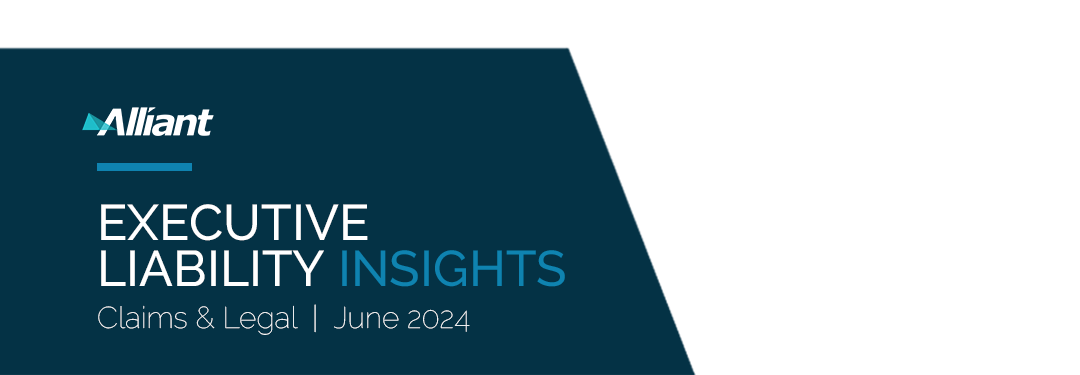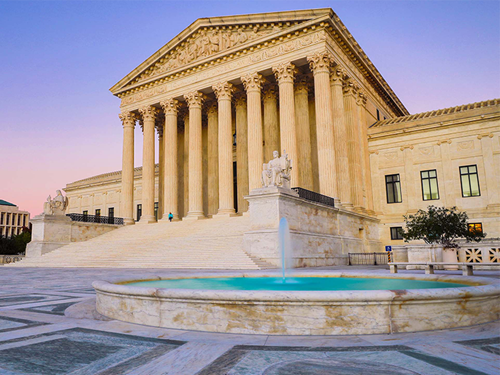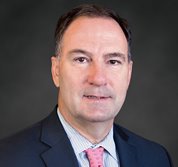
Navigating today’s complex risk environment can be a monumental task. Steve Shappell, Alliant Claims & Legal, spearheads Executive Liability Insights, a monthly review of news, legal developments and information on executive liability, cyber risk, employment practices liability, class action trends and more.


FEATURED ARTICLE
SUPREME COURT PERMITS INSURER TO CHALLENGE PROPOSED CHAPTER 11 PLAN
Truck Insurance Exchange v. Kaiser Gypsum Co., Inc., et al., 2024 U.S. LEXIS 2483 (June 6, 2024).
The Supreme Court found a primary insurer qualified as a "party in interest" under the Bankruptcy Code and retained standing to challenge a proposed reorganization plan for its insureds. The insureds were companies that manufactured and sold products containing asbestos and faced numerous ongoing and future claims.
In This Issue:
PANDEMIC RELATED BUSINESS INCOME LOSS IS NOT RECOVERABLE UNDER PROPERTY INSURANCE
Another Planet Entertainment, LLC v. Vigilant Ins. Co., 2024 Cal. LEXIS 2738 (Cal. S. Ct.; May 23, 2024)
A California court held that a concert venue manager did not suffer the necessary property damage to trigger property insurance coverage. In holding so, the court left the door open for the theoretical possibility of COVID-19 pandemic to cause physical loss to the property sufficient to trigger coverage since the ruling was focused on the facts of the concert venue manager’s loss.
Read More >>
PENDING AND PRIOR LITIGATION EXCLUSION TRIGGERED BY QUI TAM ACTION
Insys Therapeutics v. Xl Specialty Ins. Co., 2024 Bankr. LEXIS 1261 (Bankr. D. Del.; May 29, 2024).
A bankruptcy court ruled that a qui tam action that was filed under seal and never served on the insured triggered a D&O policy’s pending and prior litigation exclusion (the “PPL”). The bankruptcy Trustee of a pharmaceutical company sought coverage for litigation costs stemming from a shareholder derivative suit.
Read More >>
CYBER CORNER
Click to read the following cases:
- MAJOR HOSPITAL SYSTEM HIT BY CYBERATTACK
- CYBER POLICY CORRECTLY OFFSETS PORTION OF NORMAL OPERATING EXPENSES
- COLORADO ENACTS FIRST IN THE NATION LAW GOVERNING THE USE OF AI
Read More >>
EMPLOYMENT CORNER
Click to read the following cases:
- DEPARTMENT OF LABOR ISSUES GUIDANCE FOR EMPLOYERS UTILIZING AI IN WORKPLACE
Read More >>
SECURITIES CORNER
Click to read the following cases:
- SEC FINALIZES CYBERSECURITY RULES FOR FINANCIAL INSTITUTIONS AND ADVISORS
- OFF-CHANNEL COMMUNICATIONS ARE “SHOCKINGLY COMMON” AND CONTINUE TO BE A PROBLEM FOR BROKER FIRMS
- MAY 2024 NOTEWORTHY ENFORCEMENT ACTIONS FILED
- MAY 2024 NOTEWORTHY SETTLEMENTS AND JUDGEMENTS
Read More >>
SHAREHOLDER CORNER
Click to read the following cases:
- MAY 2024 SECURITIES CLASS ACTION FILINGS
Read More >>
SUPREME COURT PERMITS INSURER TO CHALLENGE PROPOSED CHAPTER 11 PLAN
Truck Insurance Exchange v. Kaiser Gypsum Co., Inc., et al., 2024 U.S. LEXIS 2483 (June 6, 2024).


The Supreme Court found a primary insurer qualified as a "party in interest" under the Bankruptcy Code and retained standing to challenge a proposed reorganization plan for its insureds. The insureds were companies that manufactured and sold products containing asbestos and faced numerous ongoing and future claims. As part of the reorganization plan, the insureds would be permitted to fund a trust and channel all present and future asbestos-related claims into that trust. Insured claims would be filed in the tort system for the benefit of the insurance coverage, while uninsured claims would be submitted directly to the trust for resolution. The insurer sought to oppose the plan because it would not require the same disclosures and authorizations for insured and uninsured claims, which would expose the insurer to fraudulent claims, and would impermissibly alter its rights under its insurance policies. The lower court approved the plan without consideration of the insurer’s objection and the insurer appealed.
The Supreme Court found that “[a]n insurer with financial responsibility for bankruptcy claims is a ‘party in interest’ under [the Bankruptcy Code] that ‘may raise and may appear and be heard on any issue.’” The plan would require the insurer the take financial responsibility for bankruptcy claims and could be directly and adversely affected by the reorganization. “Where a proposed plan ‘allows a party to put its hands into other people’s pockets, the ones with the pockets are entitled to be fully heard and to have their legitimate objections addressed.’” The Court determined that the insurer may be the only entity with an incentive to identify problems with the plan and must be heard before the plan could be approved.
PANDEMIC RELATED BUSINESS INCOME LOSS IS NOT RECOVERABLE UNDER PROPERTY INSURANCE
Another Planet Entertainment, LLC v. Vigilant Ins. Co., 2024 Cal. LEXIS 2738 (Cal. S. Ct. May 23, 2024)


A California court held that a concert venue manager did not suffer the necessary property damage to trigger property insurance coverage. In holding so, the court left the door open for the theoretical possibility of COVID-19 pandemic to cause physical loss to the property sufficient to trigger coverage since the ruling was focused on the facts of the concert venue manager’s loss.
As a result of the COVID-19 pandemic, many businesses were forced to cease operations and, as a result, suffered business income losses. The concert venue manager (the “Venue”) was among them, as its venue closed. The Venue submitted a Claim to its property insurer (the “Insurer”) for direct physical loss or damage to the property, as well as the subsequent economic loss. The Insurer denied coverage, arguing that the Venue failed to show “physical loss or damage that would implicate coverage” under the Insurer’s policy.
The Venue urged the court to recognize that coverage under the property policy was triggered because the COVID-19 virus bonded with the property at issue on a microscopic level. However, the court held that such alteration to the property did not result in the impairment of the property necessary to trigger coverage. The court explained that, while “[t]he physical alteration need not be visible to the naked eye, nor must it be structural, [ . . . ] it must result in some injury to or impairment of the property as property.” According to the court, the mere fact that the Venue’s property cannot be used for its intended purpose was insufficient to establish direct physical loss to the property. Similarly, being forced to curtail business operations was insufficient because doing so did not entail suffering direct physical loss or damage to property.
While this, and similar decisions in other courts and jurisdictions do not foreclose the possibility of COVID-19 related loss to enjoy coverage, courts indicated that the practical effect of their holdings would serve as bar to coverage in most scenarios.
PENDING AND PRIOR LITIGATION EXCLUSION TRIGGERED BY QUI TAM ACTION
Insys Therapeutics v. Xl Specialty Ins. Co., 2024 Bankr. LEXIS 1261 (Bankr. D. Del. May 29, 2024).


A bankruptcy court ruled that a qui tam action that was filed under seal and never served on the insured triggered a D&O policy’s pending and prior litigation exclusion (the “PPL”). The bankruptcy Trustee of a pharmaceutical company sought coverage for litigation costs stemming from a shareholder derivative suit. The carrier denied coverage based on the PPL exclusion, which provided that:
[i]n consideration of the premium charged, no coverage will be available under this Policy for claims based upon, arising out of, directly or indirectly resulting from, in consequence of, or in any way involving any fact, circumstance, situation, transaction, event or wrongful act, underlying or alleged in any prior and/or pending litigation or administrative or regulatory proceeding or arbitration which was brought prior to [the cutoff date] (emphasis added).
The carrier argued the derivative suit arose out of the same facts as a qui tam suit, both actions challenged the same allegedly fraudulent scheme to market opioid products, filed under seal prior to the policy’s PPL cutoff date. The qui tam action was dismissed and never served on the company and the company was unaware of its existence when it obtained the policy. The Trustee argued the unique procedural characteristics of qui tam suits call for different treatment under the PPL exclusion and the word "brought" was ambiguous.
The Trustee argued that "brought" could reasonably be interpreted to mean the action must be both filed and served. The court found it was not ambiguous because it is commonly understood that litigation is "brought" when a complaint is filed. The court also found that the policy made no distinction between qui tam actions and other kinds of civil actions and so the qui tam’s procedural characteristics had no bearing on the application of the PPL exclusion. Despite the company’s lack of awareness of the qui tam action, the carrier was still able to disclaim coverage for the later filed derivative suit. This case highlights the importance of policy language, especially in context of exclusions.
Cyber Corner
MAJOR HOSPITAL SYSTEM HIT BY CYBERATTACK
Healthcare organizations have recently become a frequent target for cyberattacks, resulting in breaches of patients’ health information and other personally identifiable information. Earlier this month, a major hospital system was hit by a cyber breach that disrupted its clinical operations and prompted notification to the system’s business partners to disconnect from its network.
CYBER POLICY CORRECTLY OFFSETS PORTION OF NORMAL OPERATING EXPENSES
Applying Arkansas law, a federal court determined a cyber carrier correctly offset expenses paid when calculating the business interruption loss stemming from a ransomware attack against its insured. The attack disrupted the telemarketer’s business for months and the company sought recovery for lost profits during the interruption, as well as ongoing overhead expenses, payroll, and administrative costs.
COLORADO ENACTS FIRST IN THE NATION LAW GOVERNING THE USE OF AI
The Colorado Artificial Intelligence Act (CAIA), signed into law on May 17, 2024, is a landmark piece of legislation in the United States. It establishes the first comprehensive legal framework for governing artificial intelligence (AI) systems. The CAIA focuses on preventing algorithmic discrimination, a growing concern, as AI is increasingly used in critical decision-making processes like loan approvals, employment screening, and healthcare.
Employment Corner
DEPARTMENT OF LABOR ISSUES GUIDANCE FOR EMPLOYERS UTILIZING AI IN WORKPLACE
The US Department of Labor (“DOL”) has recently issued two sets of guidance for employers utilizing artificial intelligence (“AI”) in the workplace. While AI technology can help increase productivity and efficiency in employer’s decision-making, these employers are still obligated to comply with employment-related state and federal laws.
Securities Corner
SEC FINALIZES CYBERSECURITY RULES FOR FINANCIAL INSTITUTIONS AND ADVISORS
The SEC recently approved a final revision to the data privacy rules governing many financial entities, contained in what is known as Regulation S-P.
The new requirements apply to Registered Investment Advisors (“RIA’s”), Broker-Dealers, investment companies, funding portals, and transfer agents. The final rule requires these entities to develop written protocols to protect clients’ confidential information, have mechanisms in place to identify unauthorized access to such data, and to create an incident response plan which, along with containment and remediation measures, would require regulated entities to notify impacted customers of any breach within thirty days of its discovery.
OFF-CHANNEL COMMUNICATIONS ARE “SHOCKINGLY COMMON” AND CONTINUE TO BE A PROBLEM FOR BROKER FIRMS
Due to recent changes such as hybrid or remote work to developing technology, off-channel business communications continue to be a problem for firms in the financial services sector. Such communications often include the use of personal devices, forwarding of e-mails through personal e-mail addresses, conversations via text-messages on a personal device, or the use of off-channel applications for business communications.
|
Director/Officer |
Role |
Company |
|
Robert Thompson |
Founder |
Financial Freedom Foundation d/b/a F3 Mastermind |
|
Joseph James |
CEO |
Pison Stream Solutions, Inc. |
|
Andrew Wiederhorn, Ron Roe & Rebecca Hershinger |
Former CEO & Former CFOs |
FAT Brands Inc. |
|
Andreas Bechtolsheim |
Founder |
Arista Networks, Inc. |
|
Jack B. Blount |
CEO |
Intrusion, Inc. |
|
Director/Officer |
Role |
Company |
|
Robert Thompson |
Founder |
Financial Freedom Foundation d/b/a F3 Mastermind |
|
Joseph James |
CEO |
Pison Stream Solutions, Inc. |
|
Andrew Wiederhorn, Ron Roe & Rebecca Hershinger |
Former CEO & Former CFOs |
FAT Brands Inc. |
|
Andreas Bechtolsheim |
Founder |
Arista Networks, Inc. |
MAY 2024 NOTEWORTHY SETTLEMENTS AND JUDGMENTS
|
Amount |
Director/Officer |
Role |
Company |
|
$2,451,709.26 |
Aleksandr Blyumkin |
Officer |
Petroteg Energy, Inc. |
|
$74,399,704 |
Sean Kelly |
CEO |
Red Rock Secured |
|
$2,642,406.70 |
Joshua Sason |
Founder |
Magna Group, LLC |
|
$90,684.80 |
Erik Deitsch |
Former CEO |
Nutra Pharma Corporation |
|
Amount |
Director/Officer |
Role |
Company |
|
$2,451,709.26 |
Aleksandr Blyumkin |
Officer |
Petroteg Energy, Inc. |
|
$74,399,704 |
Sean Kelly |
CEO |
Red Rock Secured |
|
$2,642,406.70 |
Joshua Sason |
Founder |
Magna Group, LLC |
|
$90,684.80 |
Erik Deitsch |
Former CEO |
Nutra Pharma Corporation |
Source: U.S. Securities and Exchange Commission
https://www.sec.gov/litigation/admin.htm
Source: Stanford Law School Securities Class Action Clearinghouse
ABOUT ALLIANT INSURANCE SERVICES
Alliant Insurance Services is the nation’s leading specialty broker. In the face of increasing complexity, our approach is simple: hire the best people and invest extensively in the industries and clients we serve. We operate through national platforms to all specialties. We draw upon our resources from across the country, regardless of where the resource is located.
Contributors


Abbe Darr, Esq.
Claims Attorney
abbe.darr@alliant.com
David Finz, Esq.
Claims Attorney
david.finz@alliant.com
Isabel Arustamyan, Esq.
Claims Attorney
isabel.arustamyan@alliant.com
Jacqueline Vinar, Esq.
Claims Attorney
jacqueline.vinar@alliant.com
Jaimi Berliner, Esq.
Claims Attorney
jaimi.berliner@alliant.com
Karina Montoya, J.D.
Claims Advocate
karina.montoya@alliant.com
Malia Shappell, Esq.
Claims Attorney
malia.shappell@alliant.com
Michael Radak, Esq.
Claims Attorney
michael.radak@alliant.com
Peter Kelly, Esq.
Claims Attorney
peter.kelly@alliant.com
Robert Aratingi
Senior Claims Advocate
robert.aratingi@alliant.com
Steve Levine, Esq.
Claims Attorney
slevine@alliant.com